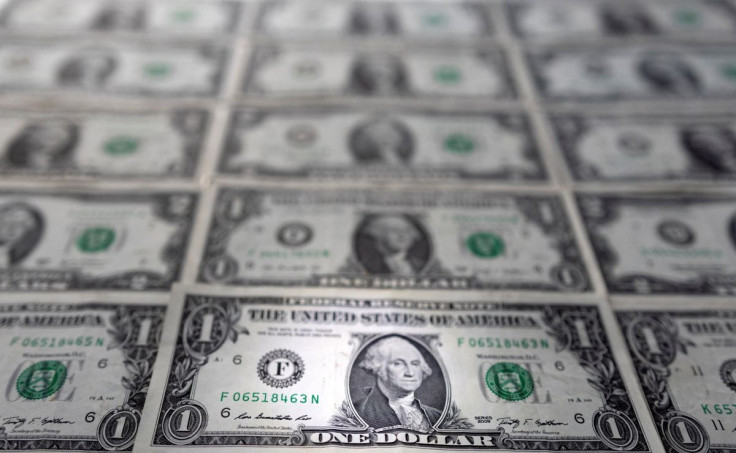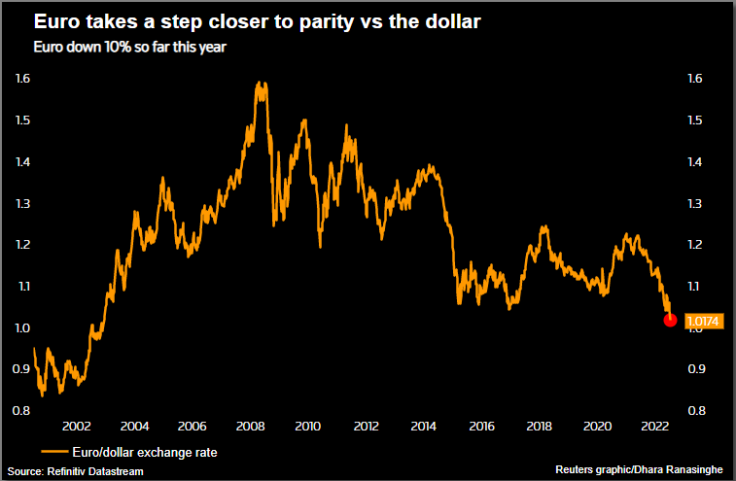Euro Drops To 20-year Low, Approaches Parity With Dollar

The euro slid to a 20-year low and came closer to parity against the dollar on Monday on concerns that an energy crisis will tip the region into a recession, while the U.S. currency was boosted by expectations that the Federal Reserve will hike rates faster and further than peers.
The biggest single pipeline carrying Russian gas to Germany, the Nord Stream 1 pipeline, began annual maintenance on Monday, with flows expected to stop for 10 days. Governments, markets and companies are worried the shutdown might be extended because of the war in Ukraine.
"The most proximate concern for markets is whether or not Nord Stream 1 is going to come back online," said Bipan Rai, North American head of FX strategy at CIBC Capital Markets in Toronto, adding that "the markets will likely price in a recession" for the region if it doesn't.
The euro tumbled as low as $1.0051 against the U.S. dollar, the weakest since December 2002.
The dollar index reached 108.19, the highest since October 2002.
The U.S. currency has gained on expectations that the Fed will continue to aggressively raise rates as it tackles soaring inflation.
"The Fed is going to raise rates more aggressively than most other developed market central banks and we don't think other developed market central banks really have the bandwidth to keep up," Rai said.
The Fed is expected to lift rates by 75 basis points at its July 26-27 meeting. Fed funds futures traders are pricing for its benchmark rates to rise to 3.50% by March, from 1.58% now. < USONFFE=>
U.S. consumers see inflation rising further in the year ahead but expect a more moderate pace over the longer term in a signal that inflation expectations remain reasonably anchored, a survey from the New York Fed showed on Monday.
Consumer price data due on Wednesday is this week's major U.S. economic focus. Economists polled by Reuters expect the index to show that consumer prices rose by an annual rate of 8.8% in June.
(Graphic: Euro heads to parity towards dollar:

)
The Australian dollar was the worst performer on the day, falling to a two-year low on global growth fears. Multiple Chinese cities have adopted fresh COVID-19 curbs, from business halts to lockdowns, to rein in new infections, which could create new supply disruptions.
The Aussie fell as low as $0.6716, the weakest since June 2020.
In the cryptocurrency market bitcoin fell 1.62% to $20,519.
========================================================
Currency bid prices at 3:00PM (1900 GMT)
Description RIC Last U.S. Close Pct Change YTD Pct High Bid Low Bid
Previous Change
Session
Dollar index 108.0000 107.0800 +0.87% 12.896% +108.1900 +107.0700
Euro/Dollar $1.0063 $1.0186 -1.22% -11.49% +$1.0183 +$1.0051
Dollar/Yen 137.2900 136.1250 +0.86% +19.27% +137.7450 +135.9850
Euro/Yen 138.17 138.56 -0.28% +6.02% +139.1600 +138.1400
Dollar/Swiss 0.9799 0.9766 +0.34% +7.43% +0.9842 +0.9738
Sterling/Dollar $1.1897 $1.2032 -1.12% -12.03% +$1.2036 +$1.1868
Dollar/Canadian 1.2988 1.2939 +0.38% +2.72% +1.3051 +1.2945
Aussie/Dollar $0.6742 $0.6856 -1.66% -7.25% +$0.6857 +$0.6716
Euro/Swiss 0.9859 0.9943 -0.84% -4.92% +0.9949 +0.9856
Euro/Sterling 0.8458 0.8460 -0.02% +0.69% +0.8488 +0.8447
NZ $0.6120 $0.6184 -0.99% -10.54% +$0.6192 +$0.6098
Dollar/Dollar
Dollar/Norway 10.1750 10.0990 +0.81% +15.56% +10.2485 +10.1225
Euro/Norway 10.2417 10.2836 -0.41% +2.30% +10.3261 +10.2379
Dollar/Sweden 10.6116 10.5083 -0.24% +17.67% +10.6473 +10.4768
Euro/Sweden 10.6797 10.7050 -0.24% +4.35% +10.7381 +10.6766
© Copyright Thomson Reuters 2024. All rights reserved.




















